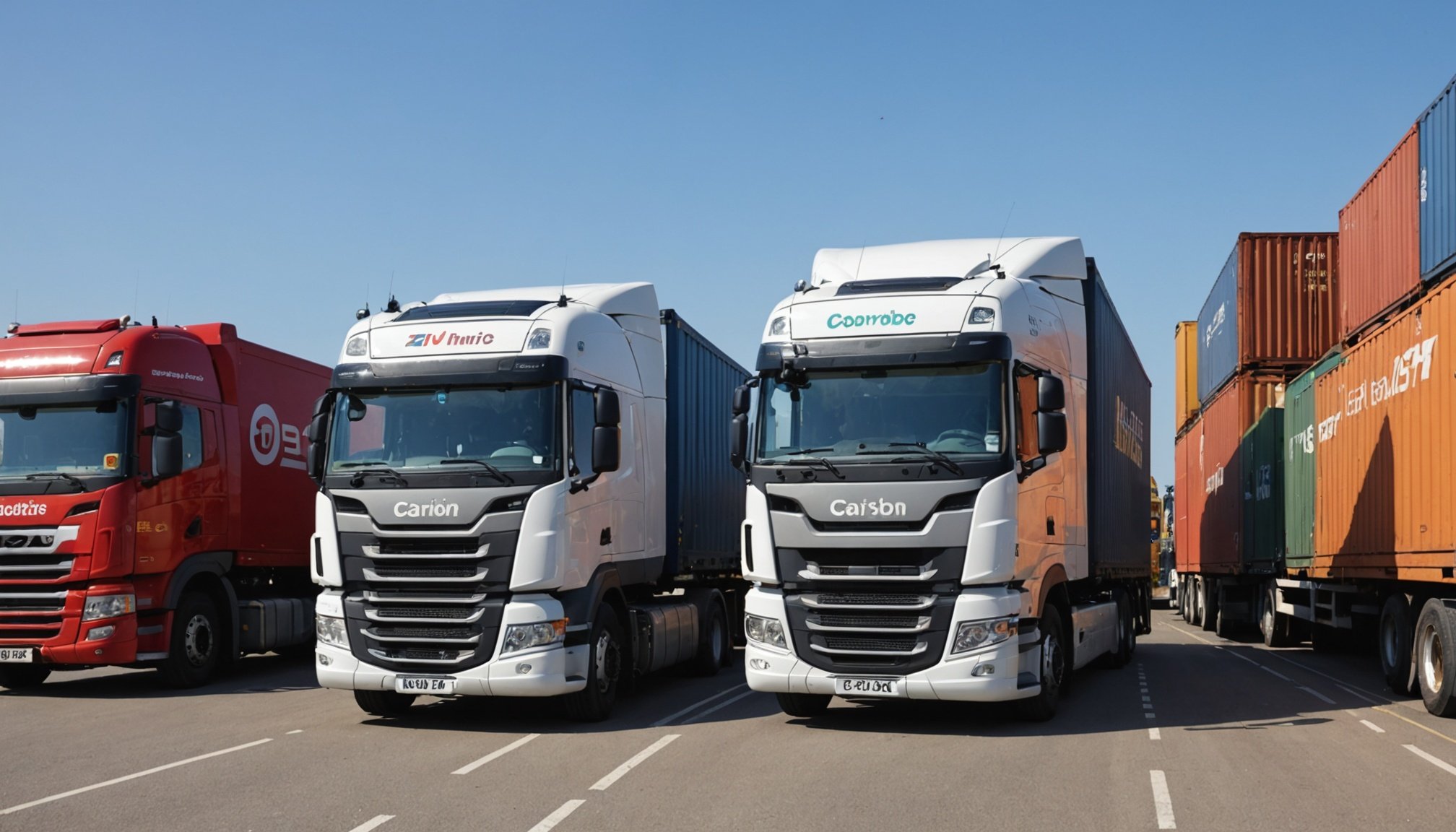Overview of Carbon Emissions in UK Logistics
The carbon emissions associated with UK logistics contribute significantly to the nation’s overall environmental impact. This sector’s current carbon footprint is shaped by the extensive reliance on fossil fuels for transportation and the heavy usage of long-haul delivery systems. With ever-increasing e-commerce and consumer demand, addressing this challenge becomes paramount.
Key challenges in reducing these emissions include the sector’s dependency on traditional fuel vehicles and the vast network needed to meet logistical demands efficiently. Logistics operations often involve complex chains that are resistant to change due to costs and infrastructural limitations. Moreover, many small and medium-sized enterprises (SMEs) face difficulty in transitioning due to financial and technological constraints.
This might interest you : Transforming supply chain clarity: uk businesses” essential guide to leveraging blockchain innovations
To mitigate this, the necessity for innovative solutions cannot be overstated. Electric and hybrid vehicles, alternative fuels such as biofuels and hydrogen, and advanced logistics technologies promise substantial emission savings. These efforts, while still developing, illustrate the potential pathways to revolutionising how goods are moved across the country. Hence, transformation is essential not only in technology but also in mindset across the industry, prompting stakeholders to invest in sustainable logistics practices actively. Through comprehensive innovation, the logistics sector can significantly reduce its carbon impact, benefiting both the environment and future economy.
Innovative Strategies in Sustainable Logistics
The UK logistics sector is embracing innovative strategies to reduce carbon emissions significantly. One pivotal approach is the implementation of electric and hybrid vehicles. These vehicles drastically cut emissions compared to traditional combustion engines, making them an attractive option for logistical operations. As battery technologies improve, their adoption becomes more practical for long-distance haulage.
Have you seen this : Navigating the uk workplace: understanding the legal framework and implications of biometric data usage
Additionally, the adoption of alternative fuels such as hydrogen and biofuels is gaining momentum. Hydrogen-powered fuel cells offer zero-emission energy, while biofuels present a renewable substitute that can lower carbon footprints. Companies are exploring these fuels’ feasibility, recognising their potential to transform logistics.
Finally, the use of advanced routing and planning technologies greatly contributes to emission reduction. These systems optimise delivery routes, decrease fuel consumption, and improve efficiency. Through real-time data analytics and predictive algorithms, logistics providers can anticipate delays, reduce idle times, and enhance overall productivity. In combination, these strategies signify a shift towards sustainable logistics, where environmental benefits align with operational efficiencies. Collectively, they offer a blueprint for a greener future, reshaping how goods traverse the supply chain.
Technologies Supporting Emission Reduction
Logistics technology plays a crucial role in reducing carbon emissions and driving sustainability. The integration of green technologies is essential for the logistics sector to become more environmentally friendly.
Telematics and Fleet Management
Telematics systems offer detailed insights into vehicle performance, helping companies track emissions and optimise fuel usage. By analysing real-time data, logistics providers can identify inefficiencies in their fleet operations. This results in better route planning, reduced idle time, and ultimately, lower fuel consumption. Fleet management solutions further enhance this by offering predictive maintenance schedules, which prevent unnecessary emissions from poorly maintained vehicles.
Automation and Robotics
Incorporating automation and robotics into logistics operations aids in minimising waste and energy use. Automated sorting systems and robotic loading equipment ensure faster processing times and reduce the energy needed for human operations. Robots can handle repetitive tasks efficiently, decreasing human errors that might lead to resource waste.
Renewable Energy Adoption
Logistics facilities are increasingly adopting renewable energy sources. By utilising solar panels and wind turbines, warehouses and distribution centres can significantly lower their dependence on traditional power sources. This green energy transformation not only supports environmental goals but also reduces operational costs.
Case Studies of Successful Initiatives
In exploring case studies and success stories, one can grasp the tangible outcomes of sustainable practices in UK logistics. Many companies have excelled in integrating eco-friendly measures, showcasing both environmental and economic gains.
For instance, a leading UK retailer successfully implemented a fleet of electric delivery vehicles within urban areas. This transition didn’t just lower their carbon emissions substantially but also cut operational costs over time. The investment in electrifying their fleet proved not only environmentally sound but also financially viable.
Another notable initiative involves a logistics company adopting biofuels across its routes. Through this shift, they saw immediate reductions in emissions, reflecting the effectiveness of renewable alternatives over traditional fuels. Such projects illustrate the practical benefits of green solutions.
Lessons learned from these efforts underline several essential strategies. Key among them is the importance of gradual integration rather than abrupt changes. By benchmarking success and sharing knowledge across the industry, these initiatives pave the way for broader adoption of sustainable logistics practices. Ultimately, examining these case studies provides invaluable insights for those striving to make meaningful and measurable environmental progress.
Regulatory Framework and Support
In the sphere of UK logistics, regulatory frameworks play a pivotal role in steering the sector towards sustainability. Stringent UK environmental regulations mandate companies to curtail their carbon emissions, ensuring they align with national environmental goals. By enforcing these measures, companies are propelled to innovate, adapting sustainability policies that transform traditional logistics practices.
The UK government bolsters these efforts through various government initiatives, providing incentives and tax benefits for adopting green technologies. This support encourages companies to invest in electric fleets, renewable energy, and efficient logistics solutions. Thus, facilitating a smoother transition to eco-friendly operations.
Regulatory frameworks also set industry standards, enforcing consistent compliance across businesses. This uniformity ensures that all stakeholders contribute equitably to emission reduction targets. Standards include emissions tracking, effective waste management, and energy efficiency mandates.
These measures present a unique opportunity: by aligning with government incentives, logistics providers can enhance both their environmental credentials and economic performance. In this way, the framework not only mitigates environmental impact but also fosters a culture of innovation and accountability within the industry. Stakeholders embracing these policies pioneer the shift towards a low-carbon future.
Future Trends in Green Logistics
As the logistics sector evolves, emerging future trends are pivotal in driving sustainable innovation. Advancements in logistics technology are set to transform the industry. Predictions indicate a greater reliance on AI-driven tools for more efficient supply chain management. These technologies promise to enhance emission reduction by optimising routes and reducing unnecessary fuel consumption.
Moreover, consumer demand plays a crucial role in shaping sustainable practices. Increasing awareness and preference for eco-friendly products push companies towards greener logistics solutions. Businesses are incentivised to adopt sustainable innovation to meet consumer expectations, thus aligning economic interests with environmental goals.
The potential impact of climate policies cannot be overstated. Enforcing strict regulations will likely accelerate the adaptation of cleaner technologies and practices across the sector. In response, companies must remain agile, proactively adjusting their operations to stay compliant and competitive.
Lastly, collaborative efforts are anticipated to increase among stakeholders. Shared industry goals will likely result in partnerships fostering knowledge exchange and technological development. By uniting under a common purpose, the logistics community can lead a profound evolution in how goods are transported sustainably, paving the way for an eco-conscious future.











